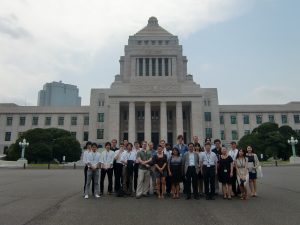Memo #192
By Justin Elavathil – justin.elavathil [at] asiapacific.ca
 Canada and Japan are set to begin negotiations to develop an Economic Partnership Agreement (EPA) on November 26th, 2012. Canada hasn’t completed a preferential trade agreement with any of its Asia Pacific partners, and Japan has yet to finalize an EPA with a G8 country. As negotiations for a Free Trade Agreement (FTA) with Korea have entered their seventh year and as regional competitors, like Australia, are forging new trade partnerships in Asia, Canada feels pressured to assert itself in the region. If Canada can learn from the stalled Korean negotiations, the Canada-Japan EPA can become the platform to accomplish such a task.
Canada and Japan are set to begin negotiations to develop an Economic Partnership Agreement (EPA) on November 26th, 2012. Canada hasn’t completed a preferential trade agreement with any of its Asia Pacific partners, and Japan has yet to finalize an EPA with a G8 country. As negotiations for a Free Trade Agreement (FTA) with Korea have entered their seventh year and as regional competitors, like Australia, are forging new trade partnerships in Asia, Canada feels pressured to assert itself in the region. If Canada can learn from the stalled Korean negotiations, the Canada-Japan EPA can become the platform to accomplish such a task.
The Canada-Korea negotiations have faltered on two issues: beef and automobiles. Korea’s insistence on using tainted beef as an excuse to protect its cattle farmers triggered Canada to withhold reducing its tariff on vehicle imports due to the lack of auto part penetration in the Korean market (or vice versa). While negotiations have progressed, these disagreements have become tit-for-tat issues.
Canada and Japan exhibit significant protectionism in agricultural industries, most notably dairy (Canada) and rice (Japan). But these protectionist policies are mutually compatible, as neither has significant exports in these sensitive sectors. Canada’s rice exports only make up .07 per cent of its cereal exports, none of which targets the Japanese market. Yet, due to similarities in market supply issues between Japan and Korea, beef and auto parts are potentially contentious points in EPA negotiations.
But Japan Business Federation (経団連) experts have asserted that these issues would not be major impediments, arguing that EPAs, compared to FTAs, focus more on an intimate integration of economies rather than one-to-one tradeoffs. If true, there are no major hurdles.
An upcoming election looms in Japan. More substantive trade agreements, like the Trans-Pacific Partnership, are becoming hot button election topics and causing inter and intra-party divisions. An EPA that features moderate, rather than radical liberalization of trade barriers is easier to sell to respective constituents. Moreover, it is the non-partisan and general ministerial support on both sides of the Pacific that would allow this EPA to be fast-tracked for completion within two years. Both countries are eager for a deal.
About the Author:
Justin Elavathil is currently a Post-Graduate Research Fellow at the Asia Pacific Foundation of Canada.

UBC’s MAAPPS students on August 2011 research trip to Japan. Trip included comprehensive negotiation simulation on Canada-Japan EPA.
Links
- Emerging Voices on Asia Blog, Asia Pacific Foundation of Canada. (Blog posts by Justin Elavathil).
Related Memos:
- Our other Memos on Japan, South Korea, and Canada.